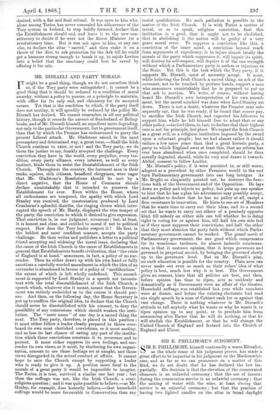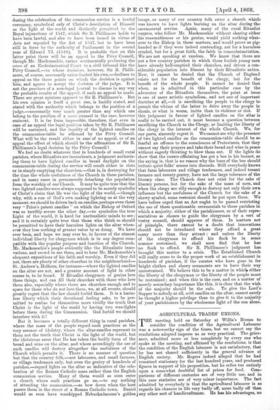SIR R. PHILLIMORE'S JUDGMENT.
SIR R. PHILLIMORE, himself confessedly a warm Ritualist, as the whole tenor of his judgment proves, has made a great effort to be impartial in his judgment on the Mackonochie case, and as far as we can pronounce on a matter of this kind, we do not doubt that he has declared the law im- partially. His decision is that the elevation of the consecrated elements is an unlawful ceremony ; that the use of ineers3 during the communion service is an unlawful ceremony ; that the mixing of water with the wine, at least during that service is an unlawful ceremony ; but that the practice of having two lighted candles on the altar in broad daylight during the celebration of the communion service is a lawful ceremony, symbolical only of Christ's description of Himself as the light of the world, and distinctly permitted by the Royal injunctions of 1547, which Sir It. Phillimore holds to have been lawful, and also to have been issued in virtue of Acts not repealed by the Act of 1547, but to have been still in force by the authority of Parliament in the second year of Edward VI. (1548). It is probable that on this latter point there will be an appeal to the Privy Council, though Mr. Mackonochie, rather sentimentally preferring the name of an Ecclesiasiastical Court to a civil tribunal like the Privy Council,—to whose decisions, however, Sir It. Philli- more, of course, necessarily subordinated his own,—declines to appeal on the three points on which the decision is against him, and agrees to accept the decision of the judge. It is not the province of a non-legal journal to discuss in any way the probable results of the appeal. if such an appeal be made. There are great opinions opposed to Sir R. Phillimore's. But his own opinion is itself a great one, is lucidly stated, and stated with the authority which belongs to the position of a judge,—necessarily very much greater than any which can belong to the position of a mere counsel in the case, however eminent. It is far from impossible, therefore, that even in case of an appeal the legal position taken by Sir R. Phillimore will be sustained, and the legality of the lighted candles on the communion-table be affirmed by the Privy Council. What will be the result either in case of no appeal, or of an appeal the effect of which should be the affirmation of Sir R. Phillimore's legal decision by the Privy Council?
We feel no doubt whatever that in hundreds of small rural parishes, where Ritualists are incumbents, a judgment authoriz- ing them to have lighted candles in broad daylight on the communion-table during the service will result either in riots or in simply emptying the churches,—that is, in destroying for the time the whole usefulness of the Church in these parishes, and in many cases in permanently detaching the population from the worship of our Church. It may be quite true that the two lighted candles were always supposed to be merely symbolic of Christ's claim that He was the light of the world,—though why, with a sun of God's own making lighting us at the very moment, we should be driven back on candles, perhaps even those very "Price's patent candles" on which the Bishop of Oxford was so terribly severe the other day,—to symbolize the true Light of the world, it is hard for umitualistic minds to see ; and it is certainly quite true that those who think so should be permitted to have their harmless lights on the altar when- ever they lose nothing of greater value by so doing. We have ever been, and hope we may ever be, in favour of the utmost individual liberty for clergymen which is in any degree com- patible with the popular purpose and function of the Church. Mr. Mackonochie's people evidently like the Ritualistic inno- vations, and crowd to see them, and to hear Mr. Mackonochie's eloquent expositions of his faith and worship. Even if they did not, there are plenty of other churches in the neighbourhood— St. Andrew's, Holborn, for instance—where the lighted candles on the altar are not, and a greater amount of light in other senses is, to be found. If Ritualist clergymen of genius love these things, and can fill their churches with those who love them also, especially where there are churches enough and to spare for those who do not love them, we, at all events, should greatly regret that the law should forbid them. It is a harm- less liberty which their devotional feeling asks, to be per- mitted to realize for themselves more vividly the truth that Christ is the light of the world by having two wax-lights before them during the Communion. God forbid we should interfere with it !
But it becomes a totally different thing in rural parishes, where the mass of the people regard such practices as the very essence of idolatry, where the altar-candles represent to them not the truth that Christ is the light of the world, but the idolatrous error that He has taken the bodily form of the bread and wine on the altar, and where accordingly the use of such candles will destroy altogether the usefulness of the Church which permits it. There is no manner of question but that the country folk,—not labourers, and small farmers, or village tradesmen only, but even the gentry of hundreds of parishes,—regard lights on the altar as indicative of the cele- bration of the Roman Catholic mass rather than the English communion service. Many of them would as soon enter a church where such practices go on.—to say nothing of attending the communion,—as bow down when the host passes them in the street of a Roman Catholic town. Daniel would as soon have worshipped Nebuchadnezzar's golden
image, as many of our country folk enter a church which was known to have lights burning on the altar during the sacramental service. Again, many of the rural Ritualist curates, who follow Mr. Mackonochie without sharing either- his reasonableness or his genius, would yield nothing what-- ever to the Bishop in these matters, and would prove as pig- headed as if they were indeed contending, not for a harmless- symbol, but for a great faith, the faith in transubstantiation. We are not speaking at random. We know that there are not a few country parishes in which these foolish young men have already half-emptied their churches, and driven a con- siderable population into Dissent by their Ritualistic antics. Now, it cannot be denied that the Church of England exists not for the benefit of the clergy, but for the benefit of the whole people. It cannot be denied that when, as is admitted in this particular case by the- advocates of the Ritualists themselves, the point at issue• is one of mere artistic symbolism, and not one of important doctrine at all,—it is sacrificing the people to the clergy to. permit the whims of the latter to drive away the people in shoals, or what is worse, incite than to violence or riot. It this judgment in favour of lighted candles on the altar is- really to be carried out, it must become a question between sacrificing the Church to the Clergy, or limiting the liberty of the clergy in the interest of the whole Church. We, for our parts, sincerely regret it. We cannot see why the presence of two lighted candles on the communion-table should be so. fearful an offence to the consciences of Protestants, that they cannot say their prayers and take their bread and wine in peace- without eagerly thirsting to blow them out. If the lights do. show that the curate officiating has got a bee in his bonnet, as the saying is, that is no reason why the buzz of the bee should' irritate quiet folks' senses into discords. Still everybody knows- that farm labourers and village tradesmen, and indeed tenant farmers and county gentry, have not the large tolerance of the literary class. The Church does not exist for the sake of literary persons, but for the sake of the mass of men, and when the clergy are silly enough to destroy not only their own. influence but the usefulness of the Church for the sake of a showy symbol, some restraint should be put upon them. We have before urged that an Act ought to be passed restricting the use of these questionable ceremonials to those parishes in which a majority, either of the parishioners, or of their repre- sentatives as chosen to guide the clergyman by a sort of vestry council, should approve of them. In matters not of principle, there cannot be a doubt that innovations should not be introduced where they offend a great many more than they attract : and unless the liberty of the clergyman to offend his flock be in some manner restrained, we shall soon find that he has- no flock to offend. Sir R. Phillimore's judgment has, brought this matter to a crisis. The Established Church will really cease to do the proper work of an establishment in hundreds of parishes, if the curates who have gone in for- bright clothes and showy ornaments are to have their way- unrestrained. We believe this to be a matter in which a either the liberty of the clergyman or the liberty of the people must be restrained ; and when this is the case, and on a matter of merely secondary importance like this, it is clear that the wish of the majority should be the rule. To give the Lord's, Supper to nobody at all, with candles on the altar, cannot surely be thought a higher privilege than to give it to the majority- of your parishioners by the wholesome light of the sun alone..































 Previous page
Previous page